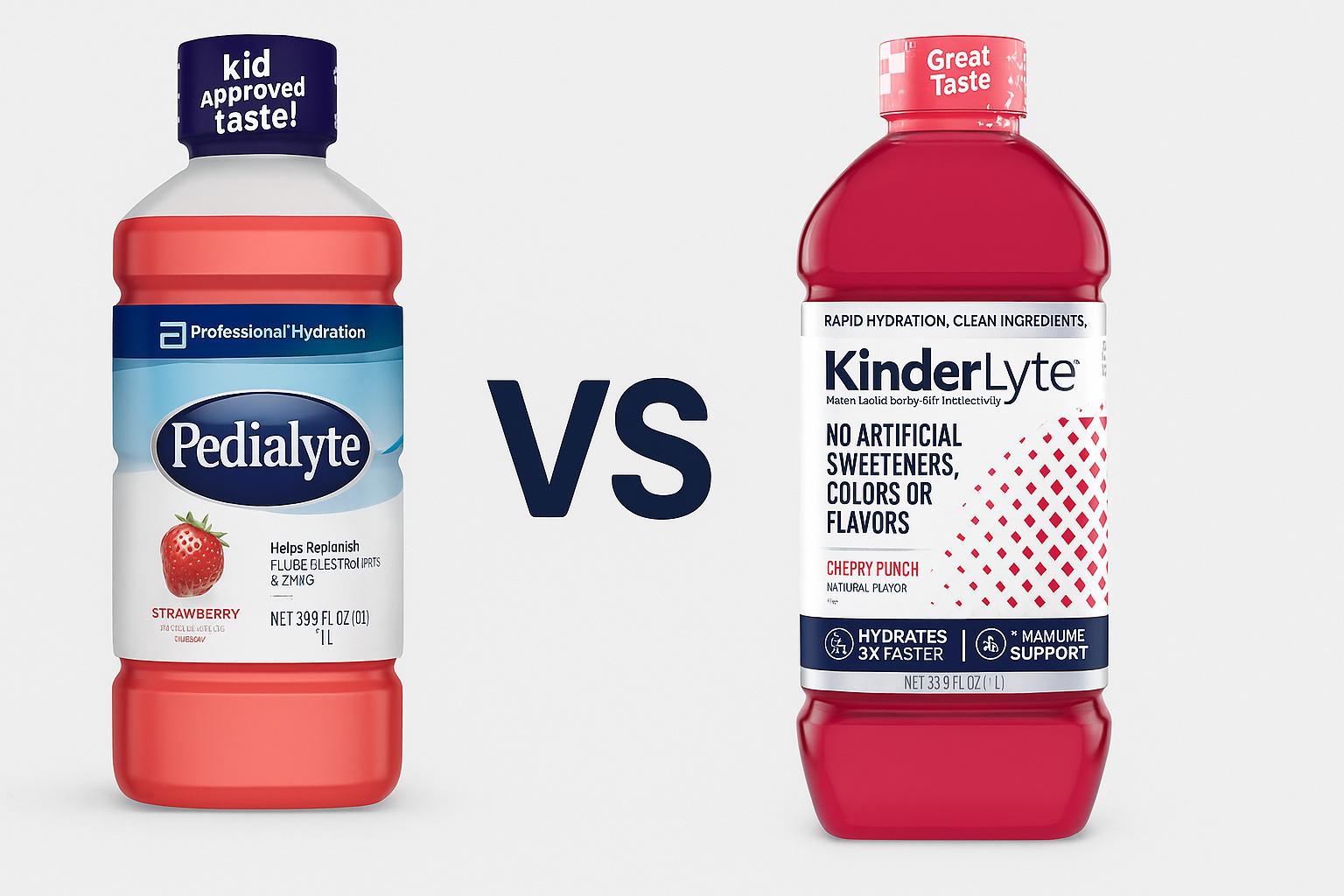Dehydration can occur quickly, whether from a stomach bug, intense exercise, or a night out. When this happens, plain water may not be enough. Oral rehydration solutions (ORS) like Pedialyte and Kinderlyte can help. Both are effective, but they have key differences. The following is a breakdown based on nutritional facts.
What is Pedialyte?
Pedialyte, an oral rehydration solution from Abbott, has been available for decades. Its formula has been used in hospitals for a long time and is often recommended by doctors to help prevent and treat dehydration. Pedialyte helps the body absorb fluids more quickly and effectively than water alone by using a balanced combination of electrolytes and sugar.
A 12-ounce (355 mL) serving of Pedialyte Classic contains approximately:
- Calories: 25
- Sugar: 5g
- Sodium: 390mg
- Potassium: 280mg
Many flavored versions of Pedialyte use artificial sweeteners like sucralose and acesulfame potassium. Checking the label is wise because some people prefer to avoid these ingredients. Pedialyte also offers a wide range of specialized products, including electrolyte water, freezer pops, powders, and formulas with added probiotics or zinc.
What is Kinderlyte?
Kinderlyte is a more recent product created by Kinderfarms. This company was co-founded by parents seeking a cleaner, more natural rehydration option. It is made without artificial sweeteners, flavors, or colors. Instead, it uses a combination of glucose, dextrose, and cane sugar for sweetness, with fruit and vegetable juices for color.
A 12-ounce (355 mL) serving of Kinderlyte typically contains:
- Calories: 30–35
- Sugar: 5–9g
- Sodium: 460mg
- Potassium: ~300mg
Kinderlyte also has an “Advanced” formula with zinc to support the immune system.
A side-by-side nutritional comparison
| Nutrient (per 12 oz) | Pedialyte Classic | Kinderlyte Original |
|---|---|---|
| Calories | ~25 | ~30–35 |
| Sugar | ~5g | 5–9g |
| Sodium | ~390mg | ~460mg (some flavors up to 620mg) |
| Potassium | ~280mg | ~300mg |
| Artificial Ingredients | Yes (in flavored versions) | No |
Key takeaway: Both products have a similar balance of electrolytes and sugar. Kinderlyte often has a slightly higher sodium content in some formulations. The main difference is the ingredients, with Kinderlyte using more natural sources for flavor and sweetness.
Taste
Taste is subjective. However, some key differences have been noted:
- Pedialyte can taste somewhat artificial, particularly the artificially sweetened versions. Some people find the flavor strong or medicinal.
- Kinderlyte has a more natural, less intense flavor. It is less salty and feels lighter on the stomach, which can be beneficial when feeling unwell.
Choosing the right product
Both products can be kept on hand. The choice may depend on the situation:
- For serious illness: In cases of severe vomiting or diarrhea, Pedialyte Classic may be preferred. Its long history of use in hospitals and reliable formula can provide peace of mind during more severe dehydration.
- For everyday hydration: When a clean, natural boost is needed—after a long, hot day or a minor sickness—Kinderlyte, especially the Advanced formula with zinc, may be preferred. It tastes good and avoids artificial ingredients.
Both Kinderlyte and Pedialyte are effective oral rehydration solutions when used as directed. The choice between them often depends on personal priorities: clinical tradition (Pedialyte) or cleaner ingredients (Kinderlyte).
Frequently asked questions
Can adults drink Kinderlyte or Pedialyte?
Yes, both are safe and effective for adults. Many use them for hangovers, exercise-induced dehydration, or travel-related illness.
Is Pedialyte better than Gatorade?
Yes, for treating mild to moderate dehydration due to illness, Pedialyte is typically better than sports drinks like Gatorade. Sports drinks often have too much sugar and not enough sodium to be effective for illness-related rehydration.
Do all doctors recommend Pedialyte?
While Pedialyte is a widely known and trusted brand, medical professionals will often recommend any oral rehydration solution that meets the established World Health Organization (WHO) guidelines for electrolytes. Store-brand versions also work just as well as name brands.
Should you dilute Pedialyte?
No, Pedialyte or any other ORS should not be diluted with water. The balance of electrolytes and sugar is precise, and adding more water can make it less effective.
